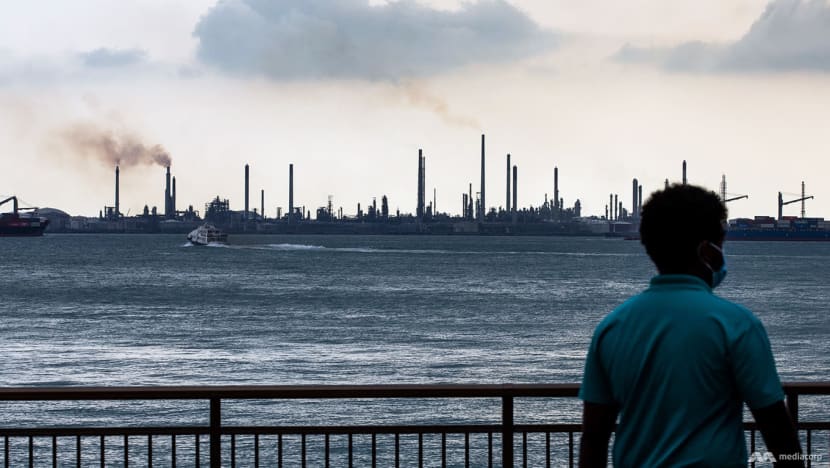Singapore proposes raising carbon tax to S$25 per tonne for greenhouse gas emissions in 2024 and 2025
Progressive increases will set Singapore on a trajectory to reach between S$50 to S$80 per tonne by 2030, said Minister for Sustainability and the Environment Grace Fu.

SINGAPORE: Singapore plans to raise its carbon tax to S$25 per tonne for greenhouse gas emissions in 2024 and 2025, and S$45 per tonne for greenhouse gas emissions in 2026 and beyond.
Speaking in Parliament on Tuesday (Nov 8) at the second reading of the Carbon Pricing (Amendment) Bill, Minister for Sustainability and the Environment Grace Fu said that the progressive increases will set Singapore on a trajectory to reach between S$50 and S$80 per tonne by 2030.
"We have decided to raise the carbon tax level progressively in phases and with advance notice, to give our businesses time to plan and carry out their low-carbon transition," said Ms Fu in her opening speech.
"We need an effective carbon price to activate carbon mitigation solutions that will help us achieve our net zero ambition. The carbon price provides an effective policy to motivate emitters to take action to reduce their emissions," she added.
Finance Minister Lawrence Wong outlined these moves in his Budget speech earlier this year.
Ms Fu said that the proposed carbon price was set after careful balancing of Singapore’s environmental, economic and social needs.
"Too low a carbon price will not provide sufficient incentive to make the necessary changes to achieve our emissions target," she added.
"Too high a price will make the change too steep, erode competitiveness, and destabilise our corporate sector.
"We have considered the availability of cost-effective green technologies and products, the pace of change we need to have and that our private sector can manage, and the support we need to give our companies and people to cushion the impact where necessary. All that within the intention of reaching our net-zero pathway."
Currently, Singapore’s carbon tax rate – applied to facilities that directly emit at least 25,000 tCO2e of greenhouse gas (GHG) emissions per year – is set at S$5 per tonne until 2023.
Carbon pricing has been implemented in many countries, said Ms Fu.
"Close to 70 jurisdictions worldwide have implemented carbon pricing instruments, covering about a quarter of global emissions. Major economies, such as the EU, are driving global convergence through the imposition of carbon border adjustment mechanisms, intending to place equivalent tariffs on imports from countries with low or no carbon prices," she said.
Last month, Mr Wong announced that Singapore will raise its climate target to achieve net-zero by 2050 as part of its long-term low emissions development strategy. Previously, the country said it would do so “as soon as viable in the second half of the century”.
Speaking at the Singapore International Energy Week, Mr Wong added that Singapore will reduce emissions to around 60 million tonnes of carbon dioxide equivalent (MtCO2e) in 2030, after peaking emissions earlier.
The difference is equivalent to reducing Singapore's current transport emissions by two-thirds, Mr Wong said then.
PROVIDING VARIOUS FRAMEWORKS
The Bill sets out "broad parameters" of a framework which will provide transitory allowances to companies in Emissions-Intensive Trade-Exposed (EITE) sectors, said Ms Fu.
"We are mindful that our EITE companies will face higher costs than their counterparts in jurisdictions with no or lower effective carbon prices. These transitory allowances will not offset the entire carbon tax obligation of the EITE companies," she added.
"It will be limited to only a portion of companies’ emissions, help to alleviate near-term competitiveness concerns, and provide a form of support to the companies as they work on reducing emissions and invest in cleaner technologies."
By providing such a framework, Singapore minimises the risk of carbon leakage – where companies relocate to another jurisdiction with less stringent climate policies, explained Ms Fu.
"To drive our industry towards becoming best-in-class, the amount of allowances awarded to each facility will be determined based on their performance on specified energy efficiency or carbon intensity benchmarks, or their decarbonisation plans," she added.
The Bill will also set up a framework for International Carbon Credits (ICC), which are tradable certificates representing the reduction or removal of emissions from the atmosphere, generated from projects or programmes outside Singapore.
These carbon credits are generated by emissions reduction or removal projects that would not have materialised under a business-as-usual scenario but are made possible due to financing from carbon markets, added Ms Fu.
Under the ICC framework, companies will have the option to tap on eligible ICC to fulfil part of their carbon tax liability. At the same time, the framework will also ensure that the ICC surrendered are of high environmental integrity and compliant with Article 6 of the Paris Agreement, added Ms Fu.
"I should emphasise that while the ICC framework provides a complementary pathway for companies to decarbonise, reducing emissions through domestic abatement efforts will remain our priority," she added.
As such, the ICC surrendered must be capped at a prescribed facility-level limit. This is currently intended to be set at 5 per cent of taxable emissions and will be prescribed in the subsidiary legislation.
"The Carbon Pricing (Amendment) Bill will ensure that our carbon pricing regime remains fit for the future, strengthens the impetus for businesses and individuals to reduce their carbon footprint, and supports the growth of the green economy, in particular, contributing to the establishment of high-integrity, internationally credible carbon markets," said Ms Fu.
"It is informed by our principled, balanced approach to carbon pricing, and reflects Singapore’s unwavering commitment to decisive climate action."
















